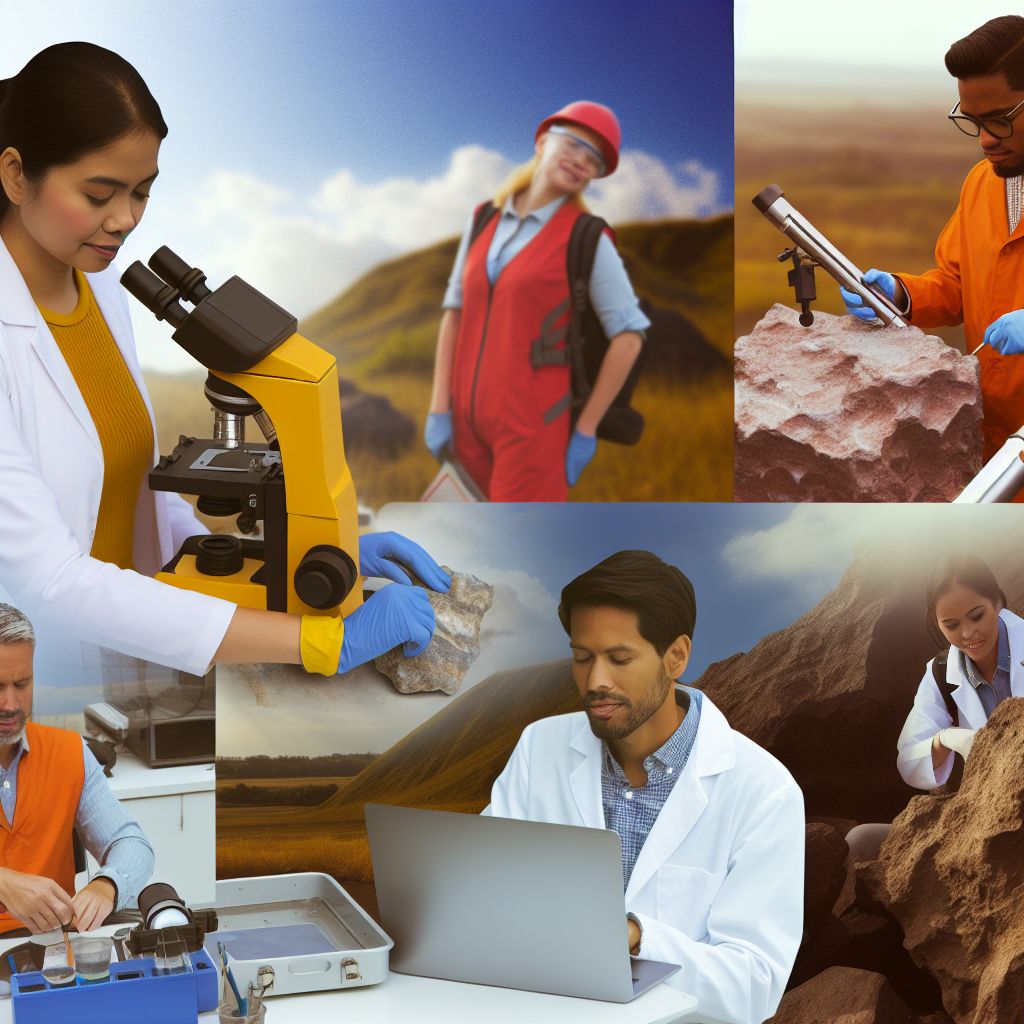Deutsch: Geologe / Español: Geólogo / Português: Geólogo / Français: Géologue / Italiano: Geologo
Geologist in the Space industry context refers to a scientist who specializes in the study of the composition, Structure, and history of planetary bodies other than Earth. This includes studying the rocks, surface materials, and geological processes of planets, moons, asteroids, and comets within our solar system and beyond. In the realm of space exploration, geologists play a crucial role in understanding the geological aspects of Celestial bodies, which can provide insights into the history of the solar system, planetary processes, and the potential for life on other planets.
Description

Space geologists use a variety of tools and methods to conduct their Research, including remote sensing, robotic landers, rovers equipped with scientific instruments, and sometimes samples returned to Earth by missions. These professionals apply principles of earth Geology to extraterrestrial bodies, analyzing surface features and mineral compositions to draw conclusions about the environments in which they formed.
Application Areas
Geologists in the space sector are involved in numerous important activities:
- Mission Planning and Support: Geologists help to Design and select landing sites for rovers and landers based on scientific objectives and safety. They also play a key role in interpreting Data sent back from these missions.
- Astrobiology: By studying the geological context in which life might arise, space geologists contribute to our understanding of potential life on other planets.
- Resource Identification: Identifying and assessing potential resources for future human missions, such as Water ice or useful minerals.
- Educational and Public Outreach: Communicating geological findings to the public and academic communities, helping to increase understanding of space missions and their significance.
Well-Known Examples
- NASA’s Mars Science Laboratory: The Curiosity Rover, which has been exploring the Gale Crater on Mars, relies heavily on the expertise of geologists to interpret its findings from rock and soil samples.
- Apollo Lunar Geologists: During the Apollo moon missions, several astronauts were trained in geology and conducted field geology studies on the Moon to collect samples and make observations about the lunar surface.
- Hayabusa and OSIRIS-REx Missions: These missions aimed to return samples from an asteroid to Earth for detailed analysis by geologists among other scientists.
Treatment and Risks
Working as a geologist in the space industry involves unique challenges and considerations:
- Interdisciplinary Collaboration: Geologists often work closely with other scientists and engineers, requiring good teamwork and Communication skills.
- Remote and Robotic Operations: Much of the work involves interpreting data from Spacecraft and remotely operated vehicles, which demands a high level of skill in remote sensing and robotic operations.
- Hazardous Environment Training: For missions involving human crews, geologists may undergo rigorous training to prepare for the hostile environments of other planetary bodies.
- Continual Learning and Adaptation: Space geologists must stay abreast of technological advancements and new scientific discoveries to effectively apply their knowledge to extraterrestrial contexts.
Similar Terms
- Planetary Scientist: Sometimes used interchangeably with space geologist, although planetary science includes a broader range of scientific disciplines studying the planets.
- Astrogeologist: Specifically focuses on the geological aspects of celestial bodies in the context of space Exploration.
Summary
In the space industry, a geologist is a scientist who specializes in studying the geology of planetary bodies other than Earth. Their work is Critical for interpreting the geological history of these bodies, assessing their resource potential, and planning missions that can safely and effectively explore these distant environments. Geologists contribute significantly to our understanding of the solar system's Evolution and the possibilities for life beyond Earth.
--
Related Articles to the term 'Geologist' | |
| 'Geomorphology' | ■■■■■■■■■■ |
| Geomorphology in the space industry context refers to the study of the physical features, landforms, . . . Read More | |
| 'Volcanism' | ■■■■■■■■■■ |
| Volcanism in the space industry context refers to the study and observation of volcanic activity on planets, . . . Read More | |
| 'Geophysics' | ■■■■■■■■■■ |
| Geophysics is a subject of natural science concerned with the physical processes and physical properties . . . Read More | |
| 'In-situ' | ■■■■■■■■■■ |
| In the space industry context, in-situ refers to the observation, analysis, or utilization of materials . . . Read More | |
| 'Geochemistry' | ■■■■■■■■■■ |
| Geochemistry in the space industry context refers to the study of the chemical composition and processes . . . Read More | |
| 'Regolith' | ■■■■■■■■■ |
| Regolith: In the space industry context, regolith refers to the layer of loose, heterogeneous material . . . Read More | |
| 'Moon' | ■■■■■■■■ |
| The Moon is the Earth's only natural Satellite, and it is the fifth largest moon in the solar system. . . . Read More | |
| 'Seismology' | ■■■■■■■■ |
| Seismology is the study of earthquakes and other seismic activity. In the Aerospace context, Seismology . . . Read More | |
| 'Tectonics' | ■■■■■■■ |
| Tectonics: In the space industry context, tectonics refers to the study and analysis of the structure, . . . Read More | |
| 'Discovery' | ■■■■■■■ |
| In the aerospace context, "Discovery" can refer to a few different things, including: . . . Read More | |
